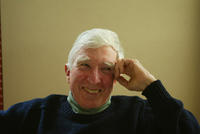
"I hate words."
"Words suck."
"If I wanted to read, I'd go to school."
Beavis & Butthead
Maybe you're too young to remember Beavis and Butthead, two of the dumbest and crudest creations to ever inhabit the boob tube. The creator of the moronic pair, Mike Judge, was actually spoofing moronic rock & roll teenagers like B & B. Ironically, Judge's targets didn't get the zingers. Which made the popularity of B & B even more widespread.
Now unlike B & B, you see the value of knowing "words."
And this prof does, too, and he recognizes his duty to prepare you for the rigors of the SAT, where words like acumen and anathema still lurk in the dark corners of that test like critical readings and sentence completions. Of course, you have the acumen to recognize that knowing and using words like this make you can also make you a more effective persuasive and creative writer, a real contributor to our enlightened democracy and to our Creative and Critical Writing classes.
Here's your assignment.
Pick any five of these words and write five REALLY GOOD sentences using those words correctly in context, giving a clue to the meaning of the word.
These sentences should appear on the blog BEFORE CLASS on Wednesday, September 10.
We'll have a quiz on these words at a later date, too, using your sentences (I hope).
"He, he, huh, he, huh, huh, he, slobber, slobber."
A
abjure
(v.) to reject, renounce (To prove his honesty, the president abjured the evil policies of his wicked predecessor.)
abrogate
(v.) to abolish, usually by authority (The Bill of Rights assures that the government cannot abrogate our right to a free press.)
acerbic
(adj.) biting, bitter in tone or taste (Jill became extremely acerbic and began to cruelly make fun of all her friends.)
acrimony
(n.) bitterness, discord (Though they vowed that no girl would ever come between them, Biff and Trevor could not keep acrimony from overwhelming their friendship after they both fell in love with the lovely Teresa.)
acumen
(n.) keen insight (Because of his mathematical acumen, Larry was able to figure out in minutes problems that took other students hours.)
adumbrate
(v.) to sketch out in a vague way (The coach adumbrated a game plan, but none of the players knew precisely what to do.)
alacrity
(n.) eagerness, speed (For some reason, Chuck loved to help his mother whenever he could, so when his mother asked him to set the table, he did so with alacrity.)
anathema
(n.) a cursed, detested person (I never want to see that murderer. He is an anathema to me.)
antipathy
(n.) a strong dislike, repugnance (I know you love me, but because you are a liar and a thief, I feel nothing but antipathy for you.)
approbation
(n.) praise (The crowd welcomed the heroes with approbation.)
arrogate
(v.) to take without justification (The king arrogated the right to order executions to himself exclusively.)
ascetic
(adj.) practicing restraint as a means of self-discipline, usually religious (The priest lives an ascetic life devoid of television, savory foods, and other pleasures.)
aspersion
(n.) a curse, expression of ill-will (The rival politicians repeatedly cast aspersions on each others’ integrity.)
assiduous
(adj.) hard-working, diligent (The construction workers erected the skyscraper during two years of assiduous labor.)
B
blandish
(v.) to coax by using flattery (Rachel’s assistant tried to blandish her into accepting the deal.)
boon
(n.) a gift or blessing (The good weather has been a boon for many businesses located near the beach.)
brusque
(adj.) short, abrupt, dismissive (The captain’s brusque manner offended the passengers.)
buffet
1. (v.) to strike with force (The strong winds buffeted the ships, threatening to capsize them.)
2. (n.) an arrangement of food set out on a table (Rather than sitting around a table, the guests took food from our buffet and ate standing up.)
burnish
(v.) to polish, shine (His mother asked him to burnish the silverware before setting the table.)
buttress
1. (v.) to support, hold up (The column buttresses the roof above the statue.)
2. (n.) something that offers support (The buttress supports the roof above the statues.)
C
cacophony
(n.) tremendous noise, disharmonious sound (The elementary school orchestra created a cacophony at the recital.)
cajole
(v.) to urge, coax (Fred’s buddies cajoled him into attending the bachelor party.)
calumny
(n.) an attempt to spoil someone else’s reputation by spreading lies (The local official’s calumny ended up ruining his opponent’s prospect of winning the election.)
capricious
(adj.) subject to whim, fickle (The young girl’s capricious tendencies made it difficult for her to focus on achieving her goals.)
clemency
(n.) mercy (After he forgot their anniversary, Martin could only beg Maria for clemency.)










